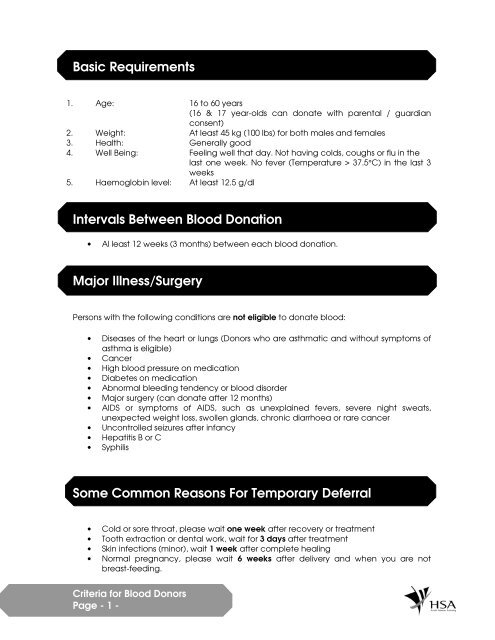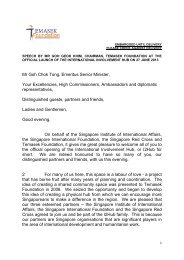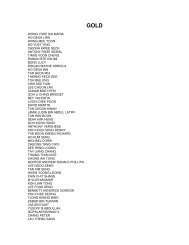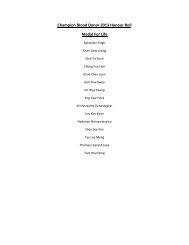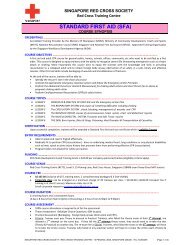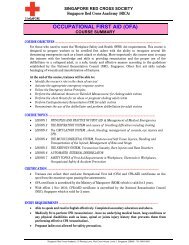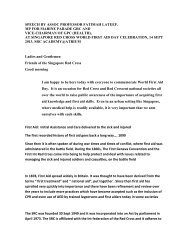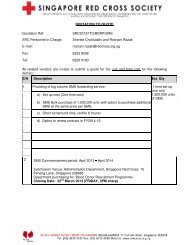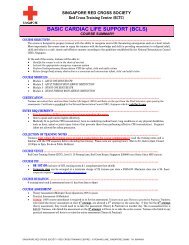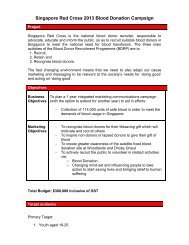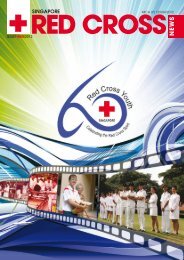Basic Requirements for Blood Donation - Red Cross
Basic Requirements for Blood Donation - Red Cross
Basic Requirements for Blood Donation - Red Cross
- No tags were found...
Create successful ePaper yourself
Turn your PDF publications into a flip-book with our unique Google optimized e-Paper software.
<strong>Basic</strong> <strong>Requirements</strong><br />
1. Age: 16 to 60 years<br />
(16 & 17 year-olds can donate with parental / guardian<br />
consent)<br />
2. Weight: At least 45 kg (100 lbs) <strong>for</strong> both males and females<br />
3. Health: Generally good<br />
4. Well Being: Feeling well that day. Not having colds, coughs or flu in the<br />
last one week. No fever (Temperature > 37.5°C) in the last 3<br />
weeks<br />
5. Haemoglobin level: At least 12.5 g/dl<br />
Intervals Between <strong>Blood</strong> <strong>Donation</strong><br />
• Al least 12 weeks (3 months) between each blood donation.<br />
Major Illness/Surgery<br />
Persons with the following conditions are not eligible to donate blood:<br />
• Diseases of the heart or lungs (Donors who are asthmatic and without symptoms of<br />
asthma is eligible)<br />
• Cancer<br />
• High blood pressure on medication<br />
• Diabetes on medication<br />
• Abnormal bleeding tendency or blood disorder<br />
• Major surgery (can donate after 12 months)<br />
• AIDS or symptoms of AIDS, such as unexplained fevers, severe night sweats,<br />
unexpected weight loss, swollen glands, chronic diarrhoea or rare cancer<br />
• Uncontrolled seizures after infancy<br />
• Hepatitis B or C<br />
• Syphilis<br />
Some Common Reasons For Temporary Deferral<br />
• Cold or sore throat, please wait one week after recovery or treatment<br />
• Tooth extraction or dental work, wait <strong>for</strong> 3 days after treatment<br />
• Skin infections (minor), wait 1 week after complete healing<br />
• Normal pregnancy, please wait 6 weeks after delivery and when you are not<br />
breast-feeding.<br />
Criteria <strong>for</strong> <strong>Blood</strong> Donors<br />
Page - 1 -
• Travelled to a malaria endemic area, wait 6 weeks to 3 years and ask the attending<br />
doctor / nurse whether you are eligible <strong>for</strong> donation<br />
• Close contact with Hepatitis B, wait 12 months and after full course of hepatitis B<br />
vaccination (and shown a satisfactory antibody response)<br />
• Infectious Diseases e.g. Chickenpox, Measles, Dengue, wait 6 months after recovery<br />
• Tattoo, pierced ears, acupuncture and blood transfusions, wait 1 year and in<strong>for</strong>m<br />
the attending doctor/nurse<br />
Medication<br />
People who are taking drugs <strong>for</strong> cancer treatment, heart diseases, high blood pressure,<br />
diabetes or current infections will not be accepted as blood donors.<br />
At least 2 days<br />
after:<br />
• Traditional Chinese Medicine (3 days)<br />
• Tetanus toxoid vaccination (48 hours)<br />
• Hepatitis B vaccination (48 hours) (48 hours)<br />
• Rabies vaccination (with no exposure) (48 hours)<br />
• Pneumococcus vaccination (48 hours)<br />
• Meningococcus vaccination (48 hours)<br />
At least 1 week<br />
after:<br />
At least 2 weeks<br />
after:<br />
• Chloroquine ingestion<br />
• Antibiotic ingestion<br />
• Typhoid vaccination<br />
• Cholera vaccination<br />
• Diphtheria vaccination<br />
• Influenza (Flu) vaccination<br />
• Pertussis vaccination<br />
• Plague vaccination<br />
• Polio (injection) vaccination<br />
• Rocky Mountain Spotted Fever vaccination<br />
• Typhus vaccination<br />
At least 4 weeks<br />
after:<br />
• Maloprim or Fansidar ingestion<br />
• Mefloquine ingestion<br />
• Rubella (German Measles) vaccination<br />
• Yellow fever, measles, mumps vaccination<br />
• Oral Polio vaccination<br />
• Hepatitis A or combination Hepatitis A and B<br />
At least 1 year<br />
after:<br />
• Other animal or human serum products e.g.<br />
immunoglobulin<br />
• <strong>Blood</strong> Transfusion<br />
• Hepatitis B immune globulin<br />
• Rabies (post-exposure)<br />
Criteria <strong>for</strong> <strong>Blood</strong> Donors<br />
Page - 2 -
Travel<br />
The donor will be asked to wait <strong>for</strong> 6 weeks or more if he / she has travelled to Malaria<br />
endemic areas such as rural areas in Malaysia, Thailand, Indonesia, Philippines, India, etc.<br />
Please clarify with the attending nurse or doctor.<br />
Travel to Europe<br />
With effect from 1 July 2002, you will be ineligible to donate blood indefinitely if you fall into<br />
EITHER one of the following 2 groups:<br />
1. You have visited or lived in the United Kingdom (England, Northern Ireland,<br />
Scotland, Wales, the Isle of Man, or the Channel Island) from 1980 through 1996 <strong>for</strong> a<br />
cumulative period of 3 months or more, or you have received a transfusion of blood<br />
or blood components in the United Kingdom (England, Northern Ireland, Scotland,<br />
the Isle of Man, or the Channel Island) between 1980 till now.<br />
2. You have visited or lived in France from 1980 till now <strong>for</strong> a cumulative period of 5<br />
years or more.<br />
However, if you have stayed in Europe (besides United Kingdom and France) <strong>for</strong> a<br />
cumulative period of more than 5 years, you can donate plasma only through apheresis<br />
method.<br />
Tattoo, Ear Piercing or Acupuncture<br />
This would require a deferment period of 12 months, unless the needles used are disposable<br />
and the whole procedure is sterile.<br />
Pregnancy and Menstrual Period<br />
• Females should not donate blood during pregnancy.<br />
• They can donate after 6 weeks following a normal delivery and when they are not<br />
breast-feeding.<br />
• Females should not donate blood if they are having heavy menstrual flow or<br />
menstrual cramps.<br />
Criteria <strong>for</strong> <strong>Blood</strong> Donors<br />
Page - 3 -
The above criteria cover some common situations that will render a prospective<br />
donor unsuitable <strong>for</strong> blood donation. The doctor or nurse will exercise medical<br />
judgment during the medical interview <strong>for</strong> each individual donor.<br />
Donors who are interested in donating blood will have to bring along their NRIC or<br />
donation card <strong>for</strong> registration. Non-Singaporeans will have to produce their<br />
passports.<br />
Criteria <strong>for</strong> <strong>Blood</strong> Donors<br />
Page - 4 -


